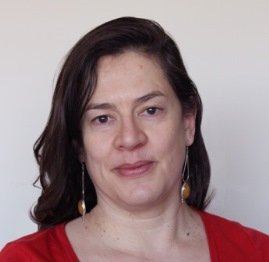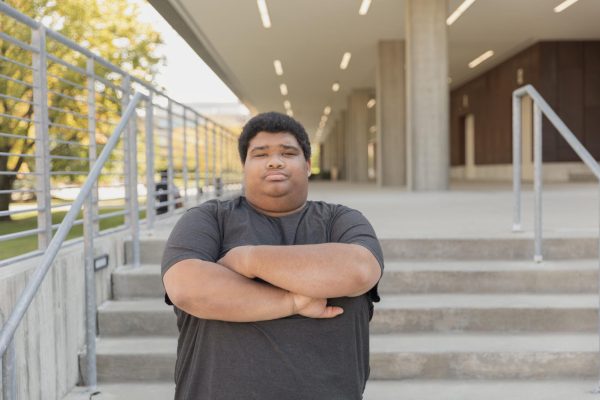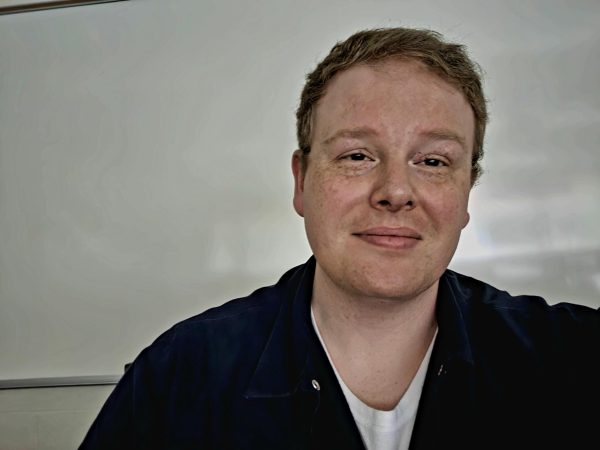Letter to the editor: The American cult of selfishness

Photo courtesy of Oakland University.
Oakland University Associate Professor of English & Creative Writing Annette Gilson.
Here in the U.S., we are taught to value wealth above most things. Wealth confers distinction on people. It makes them famous, lovable, admirable; it often puts them above the law. It doesn’t much matter to us how people get their wealth, either. The glamor of money surrounds people like an aura, and we find ourselves idolizing the wealthy and their achievement.
This cult of selfishness now pervades Oakland University. I’m writing this Thanksgiving to urge us all—students, faculty, staff, and administrators—to join together to fight against the cult of selfishness and our culture’s idolization of wealth.
When I was growing up, Thanksgiving was the one day each year that my family spent with our wealthy Summit relatives. The 18-mile drive from our lower-middle-class suburb to their upper-class one was a lesson in learning your place. As we drove, I watched smaller houses give way to bigger ones, until we arrived in Summit, where houses were as fancy as the mansion at Sunset Terrace. I felt anxious on that drive, even when I was very young, because I knew what I was in for: conversations with my cousins about their Ivy League prep schools and, later, universities; their upcoming ski trips; their tropical getaways. I learned to be ashamed of who I was during that holiday, ashamed of my class background, my public-school education, the basement bedroom I occupied back home, with its bed-set from Sears and its pine paneling hiding asbestos-wrapped pipes.
It’s taken me decades to realize how lucky I was to have been born lower middle class. First off, I see now how privileged my upbringing was, compared to the lives led by so many of our fellow citizens. I was also lucky that I worked from the age of 13, selling popcorn at a movie theater (which showed porn movies at night), volunteering at church, and working in retail as a clerk in a tobacco and card store, where I also sold lottery tickets. I met people from all walks of life. I saw their dreams. And over the years, I thought a lot about my experiences—the contrast I witnessed between the wealthy people I’d see at Thanksgiving, the moderately well-off like my own family, and the working-class people I met in my after-school jobs. I thought how ironic it is that Thanksgiving is a time we are supposed to be grateful, yet it’s also the holiday that ushers in the most self-indulgent consumption period of the consumer calendar.
For this reason I have come to admire the way Indigenous peoples observe Thanksgiving day. They mourn the 400-years-long occupation by colonial forces that led to injustices and unspeakable atrocities perpetrated by the white people who migrated here. They mourn the slaughter of the buffalos and the once-thriving old-growth forests; they mourn what corporations continue to do to the waters and the farmlands and the minority populations of the US.
As a child born of the colonial culture, I know I wouldn’t be here if my ancestors hadn’t come across the waters to find a new life. I also know that the history of the human race is a history of migration. Over many thousands of years, the human species has spread from Africa out across the globe. Our ancestors left a trail behind us, of extinct species and despoiled lands. I can’t change any of that, but I can acknowledge it, as my colleagues at OU did when they crafted a land acknowledgement.
We would do well, during this time of crisis for our planet, our country, and our university, to turn back to the original stewards of this land. In the true spirit of giving thanks, we should heed the words of Leon Shenandoah, former Tadodaho of the Grand Council of the Six Nations Iroquois Confederacy, who noted: “Our religion is all about thanking the Creator. That’s what we do when we pray. We don’t ask Him for things.” He also said: “We must live in harmony with the Natural World and recognize that excessive exploitation can only lead to our own destruction. We cannot trade the welfare of our future generations for profit now.”
Our world is at a tipping point, and our university is too. Students, faculty, and staff feel betrayed by the administration. I am writing to urge all of us to start listening to each other. Students are right when they say they can’t afford to pay more in tuition, especially during a pandemic, when the university boasted an increase of $71.6 million compared to last year’s net position. We need to acknowledge that faculty and staff need cost-of-living raises. We need to recognize that all us—students, faculty, staff and administration—are all part of this institution. We can’t continue as an institution if students leave, or if faculty and staff seek out other jobs, or stop being engaged in their work because they feel discouraged and hopeless. We need all of the groups here at OU to work together to help students succeed. That is our mission.
Letters to the editor can be submitted to [email protected].






Chaturi Edrisinha • Dec 1, 2021 at 2:54 PM
Thank you Annie. Beautifully written as always. As a practicing Buddhist I cannot not have faith and hope that our OU community will come together and move forward. We are all too invested in this community for it not to. “Speramus meliora; resurget cineribus”- We hope for better things; it will rise from the ashes.”
Annette Gilson • Dec 1, 2021 at 6:39 PM
Thank you, Chaturi! The letter you wrote with Andrea is brilliant, and I thank you for your engagement and thoughtfulness. I too believe that we must move forward. I hope that we can bridge the chasm currently separating admin and students, faculty, and staff. Re resurget cineribus– I also hope that things don’t have to burn down, metaphorically speaking, before we do at last see that we share a community and need to be responsible to students and to the future.